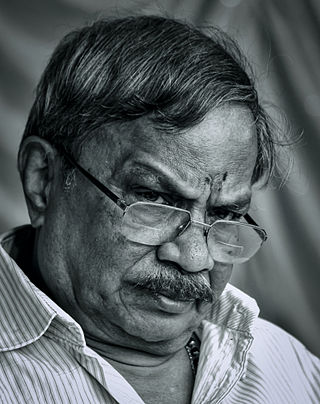
Madath Thekkepaattu Vasudevan Nair, popularly known as M.T., is an Indian author, screenplay writer and film director. He is a prolific and versatile writer in modern Malayalam literature, and is one of the masters of post-Independence Indian literature. At the age of 20, as a chemistry undergraduate, he won the prize for the best short story in Malayalam at World Short Story Competition conducted by The New York Herald Tribune. His first major novel Naalukettu, written at the age of 23, won the Kerala Sahitya Akademi Award in 1958. His other novels include Manju (Mist), Kaalam (Time), Asuravithu and Randamoozham. The deep emotional experiences of his early days have gone into the making of MT's novels. Most of his works are oriented towards the basic Malayalam family structure and culture and many of them were path-breaking in the history of Malayalam literature. His three seminal novels on life in the matriarchal family in Kerala are Naalukettu, Asuravithu, and Kaalam. Randamoozham, which retells the story of the Mahabharatha from the point of view of Bhimasena, is widely credited as his masterpiece.

Thinakkal Padmanabhan, popularly known as T. Padmanabhan, is an Indian short story writer of Malayalam literature. He is a recipient of several awards including the Ezhuthachan Puraskaram, the highest literary award of the Government of Kerala. He declined some of the earlier awards he was selected for which include Kerala Sahitya Akademi Award (1973), Odakkuzhal Award (1995) and Sahitya Akademi Award (1996). Mahatma Gandhi University conferred on him the honoris causa degree of the Doctor of Letters in 2018. In 2023, he was honoured with the Kerala Jyothi Award, the highest civilian award given by the Kerala Government.

Lalithambika Antharjanam was an Indian author and social reformer best known for her literary works in the Malayalam language. She was influenced by the Indian independence movement and social reform movements among the Nambuthiri community and her writing reflects a sensitivity to the women's role in society, in the family and as an individual.
Mullamangalath Parameshwaran Bhattathiripad, commonly known as M. P. Bhatathirippad or Premji, was a social reformer, cultural leader and actor from Kerala state, India. Premji joined Yogakshema Sabha and worked with V. T. Bhattathiripad, E. M. S. Namboodiripad and his brother M. R. Bhattathiripad in the fight against the casteism and conservatism that existed in the Nambudiri community. Premji was also a noted stage and film actor who won the National Film Award for Best Actor for the film Piravi.
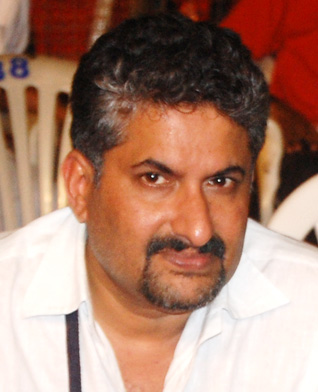
Shyamaprasad is an Indian filmmaker, screenwriter and actor from Kerala.
Mullamangalath Raman Bhattathiripad (1908–2001), also known as M. R. Bhattathiripad, was an Indian social reformer, cultural leader and a Malayalam writer.
N. P. Mohammed, popularly known by his initials N. P., was an Indian novelist, short story writer and screenwriter of Malayalam language. Along with his contemporaries like M. T. Vasudevan Nair, O. V. Vijayan, Kakkanadan, and Madhavikutty, he was known to have been one of the pioneers of modernist movement in Malayalam fiction. He was the president of Kerala Sahitya Akademi and a recipient of several awards including Kendra Sahitya Akademi Award, Kerala Sahitya Akademi Award for Story, Kerala Sahitya Akademi Award for Novel, Lalithambika Antharjanam Award, Padmaprabha Literary Award and the Muttathu Varkey Award.
Gracy is a Malayalam author. Her first collection of short stories, Padiyirangippoya Parvati, was published in 1991. Her awards include the Lalithambika Antharjanam Award (1995), the Thoppil Ravi Award (1997), the Katha Prize for the Best Malayalam Short Story (1998) and the Kerala Sahitya Akademi Award (2000). Her major works are Narakavaathil, Randu Swapna Darsikal, Kaveriyude Neru, Eezbu Penkathakal, Panikkannu and a collection, Gracyude Kathakal. Her stories have been translated into English, Hindi, Tamil and Oriya. She was the head of the Malayalam department, Al-Ameen college, Edathala, Aluva.
Sankara Pillai Guptan Nair or S. Guptan Nair was an Indian scholar, academic, critic and writer of Malayalam literature.
B. M. Suhara is a Malayalam writer from Kerala, India. She was born in Thikkodi near Calicut.
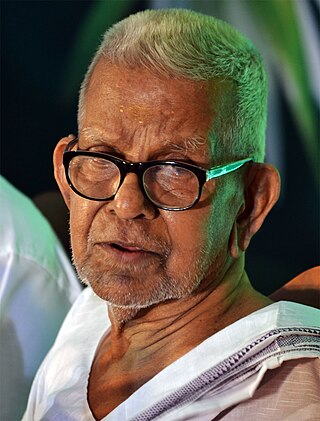
Akkitham Achuthan Namboothiri, popularly known as Akkitham, was an Indian poet and essayist who wrote in Malayalam. He was known for a simple and lucid style of writing, exploring themes of profound love and compassion in his works. Some of his prominent works included Irupatham Noottandinte Ithihasam, Balidarshanam, and Nimisha Kshetram.

Parakkulathil Vatsala was an Indian Malayalam novelist, short story writer, and social activist from Kerala. She is a recipient of Ezhuthachan Puraskaram 2021, the highest literary honour by the government of Kerala. She is only the fifth woman to receive the award since its institution in 1993.

Mundanat Leelavathy is a Malayalam writer, literary critic and educationist. She taught at various colleges in Kerala before retiring as Principal from Government Brennen College, Thalassery. During her long literary career, she won several awards including Sahitya Akademi Award and Kerala Sahitya Akademi Award. She is a contemporary of such noted critics in Malayalam including K. M. George, S. Guptan Nair, N. Krishna Pillai, P. K. Balakrishnan, M. K. Sanu and Sukumar Azhikode. Leelavathy is a recipient of the Padma Shri Award.
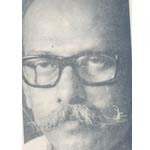
C. N. Sreekantan Nair (1928–1976) was an Indian independence activist, a Malayalam writer, short story writer, playwright and screenwriter, best known for his Ramayana trilogy – Kanchana Sita, Saketham and Lankalakshmi. He wrote 10 plays, 4 short story anthologies, book of non-fiction and collected works. Kerala Sahitya Akademi awarded him their annual award for drama in 1962. He was also a recipient of the M. P. Paul Prize.
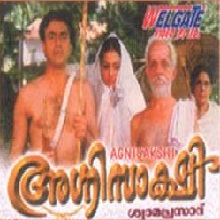
Agnisakshi is a 1999 Indian Malayalam-language spiritual film written and directed by Shyamaprasad, based on the novel of the same name by Lalithambika Antharjanam. It stars Rajit Kapur, Shobana, Srividya, Praveena, Madhupal and Madambu Kunhukuttan. The film premiered at the Soorya Festival on 14 September 1998. Agnisakshi received numerous accolades, including the National Film Award for Best Feature Film in Malayalam and nine Kerala State Film Awards. The film holds the distinction of being one of two films to get 9 Kerala State Film Awards.
N. Mohanan was a Malayalam-language short story writer and novelist from Kerala, India. He was awarded the Nalapadan Award in 1991 for his short story Sheshapathram. He received the Kerala Sahitya Akademi Award in the year 1998 for the novel Innalathe Mazha.

Priya A. S. is an Indian writer of Malayalam literature. She writes short stories, children's literature, translations and memoirs. She has translated Arundhati Roy's The God of Small Things into Malayalam under the title Kunju Karyangalude Odeythampuran of which Roy herself has said that although there have been translations in several languages, no other translation is as important to her as this, as it is the language of the novel's central characters. She is a three-time recipient of the Kerala Sahitya Akademi Award.
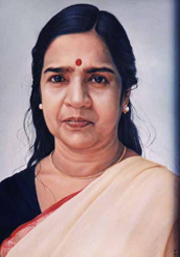
Geetha Hiranyan was an Indian writer of Malayalam literature. Known for her short stories, compiled in three books, Ottasnappil Othukkanavilla Janmasathyam, Asangaditha and Iniyum Veedatha Hrudayathinte Kadam, she was a recipient of a number of honours including G. Sankara Kurup Janmasathabdhi Kavitha Award and Kunju Pilla Smaraka Award.
T. N. Gopinathan Nair, was an Indian dramatist, novelist, poet, screenwriter and biographer of Malayalam language. One of the prolific among Malayalam playwrights, Nair published 39 plays, besides his four novels, four poetry anthologies and five biographies. He was a member of the council of Kerala Sahitya Akademi and held the char of the Kerala Sangeetha Nataka Akademi. His drama, Pareeksha, received the Vikraman Nair Trophy for the best drama and the Kerala Sahitya Akademi selected his work, Sakshi, for their annual award for drama in 1979.











